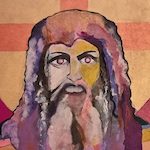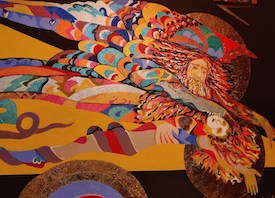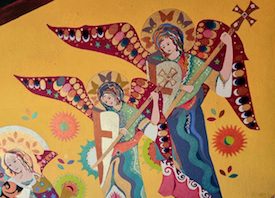Excerpts from “Letter to Ralph” in The Autobiography of God Almighty, by Jim Overbeck (p 131 ff)
In this letter, Jim explains how the early Christian Fathers countered the prevailing view of logic (stemming from Aristotle) with divine logic, through their experience of theosis. The Aristotelian theory of essences asserts that every thing has an essence (ousia) which gives it its identity, which makes it what it is and not something else; therefore, when applied to man, this negates the possibility of his metamorphosis, viz. into a god. The Greek word “ousia” was given the Latin translation “essentia”, hence English “essence”.
Abstract. Logic as understood by the Alexandrine-Byzantine mind, at least from Origen onwards, is inordinately different from that generated via Eleaticism & Aristotelianism to Gӧdel & Non-Cantorian set-theoretical formulations, and its chief features can be characterised by a dissolution of the subject and, hence, by a radicalizing of frameworks surrounding thoughts relating to ‘man’, which lead inevitably to the overthrow of the “laws” of identity, contradiction & tertium exclusi. (p131)
The logicians of Alexandria-Byzantium asserted that death is penetrable now by deification, because death (like man) is not an ousia. (p132) [They] regarded essentialism as the view that metamorphosis cannot occur… Metamorphosis is apotheosis, in which process thought is reborn into itself as the imago Dei. (p135)
… the logicians of Byzantium would see the ‘indemonstrables’ of Aristotelian and post-Aristotelian logics as mere temporal clauses, albeit clauses of such beguiling persistence that they reduce the gods to spiritless servitude. (p136)
The logicians of Byzantium used a methodology of such striking power that it renders the continuing autopsies of Kantianism, Hegelianism, etc unnecessary. They did this by the following means: they displaced the fiction of ousia in manhood by becoming theos [ie becoming God/a god]… It is precisely because man labours under the (voluntarist) delusion that he is not immediately glorifiable by ontological alteration that such alteration is proscribed. (p133)
Leontius [6th C] shares in the development of an extremely radical alteration in intellectual history – the thought that Aristotle’s theory of ousia is negated by a transfigurational hypostasis [substance/being], with man, naturally, included in this process… Alexandrine-Byzantine thought made a sharp distinction between divine and “human” logics… the latter is inevitably beset with insolubilia – antinomies, incommensurables, infinities, etc; while the former is guided by a vastly different perspective. Alexandrine-Byzantine thought is not about consistency in terms of proofs, it is about deification. The apparatus of earthly logic is insufficient in its scope, because it negates experience of the divine. (p134)
These logicians identified the divine as human and its sub-stance as not-human (or sub-human). A fallen human is a god under himself, coinciding with what he is not, viz. his sub-stance or ousia [in the Aristotelian sense]. (p 137)
Byzantine logicians asserted that the gods (divine humans) had become humans (sub-humans) by a rebellion into identity (…literally, it-entity). (p 138)
[They] recognised logic is divided into two asymmetric parts, viz. the divine-human (theos) in which words display light by irruptions of energy, and the “human” in which words do not display light by man’s refusal to be theos. Hence, for these logicians, [Orthodox Christian] reasoning was placed in a frame of reference over and against any identification with things. (p 134-5)
Thinghood… was anathematized [by these logicians] to the degree that it negated metamorphosis. Thought related to things, including abstract things, was seen as a tethering or “binding into” lower forms of consciousness. (p 135)
[They] asserted the necessity of divine visions of reality replacing thought and its (mis)representations… Because identity is unformulable without deific transfiguration, the very ground of each and every theoretical manoeuvre is seen as lacking feasibility: thus (Ps 82/81) ‘the foundations of the world are out of course’… Only deific supercession manifests Truth, and this Truth is a living being – a living being glorious, awesome, complete.. of power insuperable.. of Light, Spirit and Love.. without whom there is no Truth: ergo Almighty God. (p 136)




